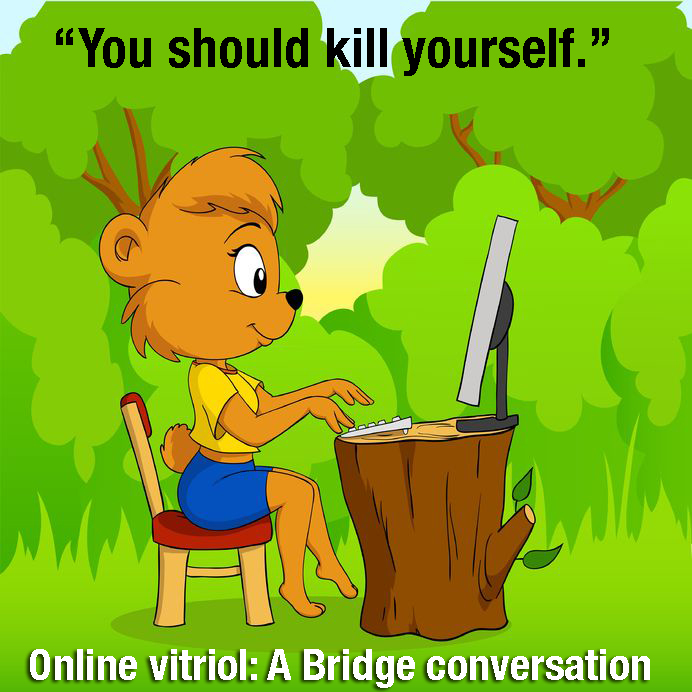No more pie fights, or how news organizations can elevate online discussion
Greg Barber is Director of Digital News Projects for The Washington Post, and has been reading, thinking about and interacting with readers in online forums since 1997. As part of Bridge’s ongoing conversation about comments, we asked Barber to talk to us about how reader comments are evolving and how we at Bridge can improve our own. The following was edited and condensed.
BRIDGE: So, when news-on-the-internet was young, some people envisioned comments as this thing with great potential for reader interaction that might add a new dimension to stories, make them better and more interesting. Instead, we got trolls and “don’t read the comments” became a catchphrase. What went wrong?
We news organizations happened. We approached it the way we approached it, which became rather stagnant. Comments on news sites today are exactly the same thing we’ve seen for 10-15 years, and they haven’t evolved the way the internet has. As part of my work with the Coral Project (a Knight Foundation-funded Mozilla/New York Times/Washington Post collaboration to help publishers build communities around their journalism), I’ve been out talking with news organizations about their approach to comments – hundreds of people, 130 or so different news organizations. Some folks have a really strong strategy about their digital communities, but by and large, lots of publishers don’t. I’ve read all the op-eds that talk about how terrible comments are, and I’ve read the stories from editors trying to do the right thing by shutting them down.
More coverage: Internet comments are where too many bullies come to play. Isn't there a better way?
By and large, we’ve put an empty box with no instructions on our pages, and then we’re shocked when readers put something there that we don’t like. Part of the challenge in evolving comments is technical: providing ways for publishers to scalably, efficiently engage with their best contributors. But we also need to change our approach. Comment sections can be good, they can be a public square, a place for new voices to surface. But we have to devote strategic thought to them.
BRIDGE: It seems as though, early on, publishers were advised – by lawyers, generally – that meddling in comments was a ticket to a courtroom, because if you allowed readers to chime in without moderation, you had to allow almost all of them. What happened to that strategy?
I don’t give legal advice, but I do know that there are plenty of readers who contribute in pleasant and insightful and sometimes inspiring ways without moderation. At The Washington Post, we have some commenters who are tremendously thoughtful. Commenters have provided interesting information, even about contentious topics, things that are eye-opening for the right reasons.
We just had a project launch called New Wave Feminism, and had writers write on what feminism means in 2016. And we opened the stories in the project to comments, which could have been a disaster. But we asked focused questions, the writers participated, and we made it a strategic point that violations would be dealt with and valuable comments would be highlighted, and it was a valuable conversation.
If people walk into a pie fight, they’ll pick up a pie. If they walk into a thoughtful conversation, many people, in my experience, will participate thoughtfully.
BRIDGE: Linking comments to Facebook accounts was supposed to fix the worst abuses by requiring people to comment under their own names, but it hasn’t done much.
Interacting with readers, being respectful and asking the right questions are all strategies that work. The Guardian announced recently that it’s paring back comments on some of its articles, especially where the conversation hasn’t been productive. The New York Times pre-moderates comments. The challenge there is that when you pre-mod, there’s not as much potential for free-flowing conversation, because posting is delayed until the moderator can get to them.
Commenters have told us that they comment because they want their voice to be heard. To improve comments, we need to establish a value structure that allows readers to understand what we’re looking for, what will get them highlighted.
Interacting in comments is one way that journalists can show readers that we value thoughtful contributions: We’re listening, we’re engaging with you. Honestly, I think that’s one reason this should be strategically important to news organizations – that give-and-take makes us special. So many readers get their news from social media, but Facebook isn’t an org that is reporting the news. Each of our organizations is. Readers can ask follow-up questions, and even influence our reporting. That’s very different, unique to news organizations, and we should take advantage of it.
BRIDGE: Moderation and having a full-time referee might work at the Washington Post or New York Times. How does a more modest publisher approach that?
Step back and ask what you want out of this space. A lot of news organizations see comments as something that came with the internet box. But what, strategically, do you want from comments? A connection with readers? Personal stories, opinions?
We scrutinize every pixel on our pages. Every space has a goal. What is the goal for your interactive space? Once you figure that out, decide what you want to do to get there. People who comment tend to be your most loyal readers. How can we make it clear what we want to have in this space? How can we show them we’re watching and what they’re saying matters?
BRIDGE: What role do writers play?
Writers worry about interacting with readers in comments, but they interact on Twitter all the time. It’s situational, and without much reason; trolls can be just as troublesome on Twitter. And none of us control Twitter. We control comments on our own sites. I’ve had experiences where interacting with users can be a loyalty factory. Certainly people who are doing well on Twitter know that.
I’ll give an example: We were doing a period of site maintenance (when some functions would be unavailable), and we let readers know. So I walked into one of our communities, and there was a snarky conversation (about it) going on. I explained what was happening, and the conversation immediately improved. Interacting with users is a great way to humanize your organization, and forge human connections with your readers. That kind of connection can happen. Once they know you, you’ve bought a fan. And for a writer, that person can follow you throughout your career.
So, readers, time to chime in: What do you think would improve Bridge comments? Would you welcome the chance to interact with our writers? Join the conversation.
See what new members are saying about why they donated to Bridge Michigan:
- “In order for this information to be accurate and unbiased it must be underwritten by its readers, not by special interests.” - Larry S.
- “Not many other media sources report on the topics Bridge does.” - Susan B.
- “Your journalism is outstanding and rare these days.” - Mark S.
If you want to ensure the future of nonpartisan, nonprofit Michigan journalism, please become a member today. You, too, will be asked why you donated and maybe we'll feature your quote next time!


 Greg Barber is Director of Digital News Projects for The Washington Post.
Greg Barber is Director of Digital News Projects for The Washington Post.